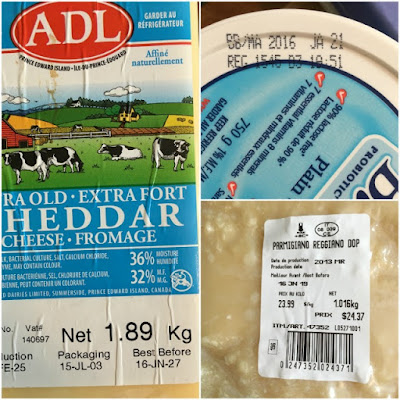Best Before and Expiration dates are two completely different things. Here’s how to understand the difference…
“When in doubt, throw it out.”
That’s an easy approach to deciding if food in the fridge is still fine to eat or if it should get tossed in the compost bin.
But what if that approach leads to more food waste than necessary?
It’s estimated that up to 40% of all food goes to waste and more than half of that waste occurs in the home. This is the food that goes bad in the fridge, the leftovers that go uneaten, and the food left on your plate that gets scraped into the trash or compost.
There are big environmental implications to this amount of food waste. It means that way more food is being grown, shipped, processed and packaged than is actually necessary. And of course there is the impact on your grocery budget.
Reducing food waste – where to start:
-
There are all sorts of ways to reduce food waste but a good place to start is not throwing out food that is still fine to eat. Sometimes it’s fairly easy to tell if food should be tossed – it either smells or tastes bad, but often food seems perfectly fine, even past the “best before” date.
-
According to dietitian Lesley Beck, best before dates are about food freshness and quality, not food safety. And she says even many refrigerated foods can be safely eaten past their best before dates, as long as they have been stored properly and still taste and smell okay.
- “Use by” and “expiry” dates on perishable foods like meat, fish and poultry should be followed.
-
Mould on firm cheese, fruits and vegetables can simply be cut off (cut an inch around the mould or rot.)
-
The Vancouver-based organization Love Food Hate Waste offers guidelines for how long you can store refrigerated foods without compromising taste ad nutrient levels. (The guidelines for meat, fish and poultry also refer to food safety.)
How long fresh food is safe to eat:
-
Milk: 7 days after “best before” date (opened or unopened)
-
Yogurt: 7 to 10 days, after “best before” date (opened or unopened)
-
Cheese, hard: 3 to 4 weeks opened, 6 months unopened
-
Butter: 4 weeks after best before date (opened or unopened)
-
Eggs, in shell: 4 weeks
-
Eggs, hard-cooked: 1 week
-
Fresh meat: 2 to 4 days
-
Fresh ground meat: 1 to 2 days
-
Deli meats: 3 to 4 days
-
Fresh chicken or turkey, whole or pieces: 2 to 3 days
-
Fresh ground poultry: 1 to 2 days
-
Cooked chicken: 3 to 4 days
-
Fresh fish: 2 to 3 days
-
Fresh shellfish: 12 to 24 hours
-
Leftover soups, stews, casseroles: 3 to 4 days
-
Jams and jellies: 3 to 4 months, opened
-
Mayonnaise: 2 to 3 months, opened
-
Mustard: 1 year, opened
-
Ketchup: 6 months, opened
-
Salad dressing or vinaigrette, bottled: 6 to 9 months, opened
-
Salsa, bottled: 4 weeks, opened
Non-perishable packaged foods can be safely consumed past their best before dates. Canned goods should be tossed if the cans are leaking or bulging.
If you do have to toss uneaten foods, put it in the compost, not the trash.







This is extremely informative article! I also had no idea about the difference between expiration date and best before. This reminds me of how much food I have thrown because of this misunderstanding. Thanks for sharing!!